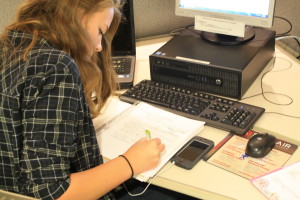 New and returning students to Sinclair may be unsure of how to study effectively. It is possible to earn the grades you want when you understand how to manage your time, stay organized, create a productive study environment and take effective notes.
New and returning students to Sinclair may be unsure of how to study effectively. It is possible to earn the grades you want when you understand how to manage your time, stay organized, create a productive study environment and take effective notes.
A popular rule of thumb states that for each credit hour a student is enrolled in, he or she should study two hours per week. For example, if a student is enrolled in one class worth four credit hours, she should expect to study eight hours a week, and if a student is enrolled in three classes worth three credit hours each, he should expect to study eighteen hours a week.
 Although this may seem to be excessive, it proves effective for many students. However, it is possible to study too much. If you decide on lengthy study sessions, you could get bored and your mind could wander, which results in wasted time. It is more effective to develop a study schedule that is reasonable in relation to your life.
Although this may seem to be excessive, it proves effective for many students. However, it is possible to study too much. If you decide on lengthy study sessions, you could get bored and your mind could wander, which results in wasted time. It is more effective to develop a study schedule that is reasonable in relation to your life.
If you are looking for time to study, you should first create a planner or calendar, which includes all activities and aspects of your life. In this planner, mark times to study for your classes. Writing your schedule down will help you visualize and better manage your time. You should carry your planner with you everywhere you go and cross off the days as they go by.
When you study, you should always start with your most difficult class. This enables you to begin your learning with a clear, fresh mind. You should also prioritize your studying based on test and exam dates, as well as deadlines for projects and papers.
You should organize your class and study materials in a way that makes them accessible to you. Having a separate binder or folder and notebook for each class can help you keep your assignments, handouts and notes organized. Many students find that color-coding their materials also helps them stay organized.
To-do lists can also be incredibly helpful for some students. If you are new to writing these lists, you should try writing your to-do list in prioritized categories, such as “homework assignments,” and “papers.”
Before sitting down to study, you should make sure that you have everything you will need. Keeping a box of office supplies such as pens, note cards and highlighters within reach will prevent you from breaking your concentration to retrieve supplies.
Taking notes is vital to success. It is important to develop your own productive system. Paraphrasing material in your notes helps you make sense of key concepts, and it will help you remember the material later.
It can be difficult to figure out what is important enough to take notes on. Remember that you do not have to write down everything your professor or book says. Always take notes of key concepts, anything your professor writes on the board and any unfamiliar terms to you.
Any college student can be successful with the right tools for effectiveness and productivity. Let’s make this semester at Sinclair a successful one.
MAGGIE STACEY
STAFF WRITER

